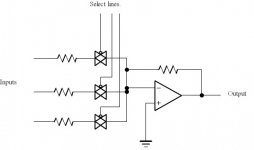Hi!
Have anyone used a 4051 multiplexer in an audio switch? I'm planning to use one in a circut with six radio channels as input. I know it's not good for hi-fi sound quality but I want it cheap and will use it for a project in school.
What sort of disturbance can I expect and are there any good ways to improve the sound quality (reduce clicks, nosie etc)?
Thanks,
Fredrik
Have anyone used a 4051 multiplexer in an audio switch? I'm planning to use one in a circut with six radio channels as input. I know it's not good for hi-fi sound quality but I want it cheap and will use it for a project in school.
What sort of disturbance can I expect and are there any good ways to improve the sound quality (reduce clicks, nosie etc)?
Thanks,
Fredrik
I've used the 4051 chips in A/V routing switchers for many years.
I've never had a problem with them.
In my design, I power them from + and - 5 volts and buffer the inputs and outputs with opamps.
I've never had a problem with them.
In my design, I power them from + and - 5 volts and buffer the inputs and outputs with opamps.
With the 405x range, the thing is to make sure that the audio signal pk-pk amplitude is a lot lower than the supply rails. Have a look at the curves of channel resistance versus signal voltage in the data sheet.
If you are using +/- 5v supplies, and your max signal amplitude is only 2V pk-pk then the FET data selector will pass your signal without adding significantly to the distortion.
If you are using +/- 5v supplies, and your max signal amplitude is only 2V pk-pk then the FET data selector will pass your signal without adding significantly to the distortion.
Ouroboros said:With the 405x range, the thing is to make sure that the audio signal pk-pk amplitude is a lot lower than the supply rails. Have a look at the curves of channel resistance versus signal voltage in the data sheet.
If you are using +/- 5v supplies, and your max signal amplitude is only 2V pk-pk then the FET data selector will pass your signal without adding significantly to the distortion.
Exactly. It works well with -10 consumer audio levels and 1V p-p composite video levels.
Please note that if the MUX is in the feedback the audio voltage across it will be almost nothing, virtual ground you know.
Thanks for your respons. I'm quiet new in audio electronics, so far, but this helped me forward.
What about a capacitor for DC offsets on the input and/or output? Would that make a big difference?
Another thing I forgot to ask is about stereo signals. Do I need two inputs on the 4051 for each stereo signal or can I connect a stereo signal on one input ? I doupt that it's possible but it would save me a 4051 🙂
Per-Anders, I'm not exactly sure what you mean by putting the mux into the neg feedback and make the connections right. Do you you know any schematic online that shows how?
Fredrik
What about a capacitor for DC offsets on the input and/or output? Would that make a big difference?
Another thing I forgot to ask is about stereo signals. Do I need two inputs on the 4051 for each stereo signal or can I connect a stereo signal on one input ? I doupt that it's possible but it would save me a 4051 🙂
Per-Anders, I'm not exactly sure what you mean by putting the mux into the neg feedback and make the connections right. Do you you know any schematic online that shows how?
Fredrik
Ouroboros said:This sort of thing I guess.
Use one 4051 per stereo channel.
If you power the ICs from a bipolar (+0-) supply, you can eliminate the coupling capacitors.
Ayah said:Per-Anders, I'm not exactly sure what you mean by putting the mux into the neg feedback and make the connections right. Do you you know any schematic online that shows how?
Ouroboros said:This sort of thing I guess.
 That's it.
That's it.It's easier if you use one IC for each channel, in other words, don't mix the channels i nthe same IC.
You can also search after analog switches as input selectors. There are many other types and you can get insiration from datasheets and application notes. CMOS4xxx swicthes är "basic", not particulary hifi or made for it, but for general digital and analog applications so you won't have any special soft switch on, break before make etc. Some of those features you'll have to fix yourself. The price is unbeatable though.
http://www.google.com/search?q=anal...illa-search&start=0&start=0&ie=utf-8&oe=utf-8
You may try Google with "analog switches input selector"
http://search.analog.com/search/default.aspx?query=analog+switches&local=en
it's just pennywise to use the '4051 when high quality muxes are available from Maxim, Analog Devices, Intersil and others.
- Status
- Not open for further replies.
- Home
- Design & Build
- Parts
- Audio quality from a 4051 mux?
